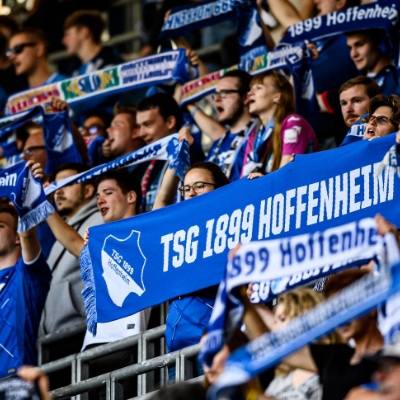Good nutrition = top performance
TSG Hoffenheim has been devoting considerable time and effort to the topic of food and drink for some time. For more than a decade now, nutritionists have been working closely with the athletes and support staff at the club. But the men's and women's Bundesliga teams and the boys' and girls' teams are not their sole focus. TSG is taking lots of action at many other levels to put people outside of the club on the path to a good diet. "We have a comprehensive system, a philosophy that is implemented across the board from the senior squad all the way down to the kids in the talented youngsters' team and is consistently applied in many areas," said Sebastian Bacher, the pedagogic director at the TSG Academy.
Why is nutrition important for elite athletes?
People who eat incorrect or bad food cannot expect their body to perform to its limits in the long term. It will have consequences, such as the body's recovery slowing down and feelings of listlessness and tiredness developing. In addition, there is a higher risk of sustaining an injury or getting ill.
What do the senior players at TSG do?
In the canteen in Zuzenhausen, all the meals are prepared in a way that meets the needs of athletes. This benefits the health of all the other employees who eat there too. Robert Gorgos, a qualified nutritionist with lengthy experience in the cycling industry, works with the players and the coaching/support staff. He has been advising them since 2017 about the food that should not appear on their table and which aisles to avoid when shopping. He even gives recipe recommendations to the chefs in the TSG canteen.
How is the food intake of the TSG players organised on matchdays?
Even the evening meal before the match is important to ensure optimal performance the next day. The TSG Bundesliga players are fed at the Zuzenhausen training ground prior to their home games, while for away matches they are provided with food that specifically caters to their needs. This is organised by nutritionist Gorgos together with the catering staff at the team hotel. On the matchday itself, snacks are provided one or two hours before kick-off (ready cut fruit, bananas, muesli bars) in the changing rooms. The players can help themselves at the half-time interval too. The food that is served after the match is also very important to ensure that energy reserves are replenished. When it comes to training camps and European away days, Walter Grözinger is employed to ensure that the team receives top-quality nutrition while they are away. The cook, who lives near the Tegernsee, has extensive experience with very successful cyclists and biathletes and offers a diverse culinary range. He is a specialist when it comes to health-conscious, modern and yet very tasty sports nutrition.
What is done for the kids at the TSG Academy?
The work carried out by nutritionist Robert Gorgos at the TSG Academy in Hoffenheim is almost even more important than what he does for the first team. Because kids have a greater tendency to eat unhealthy food than professional players. While almost all elite athletes know the importance of a healthy diet, training is provided on this matter at junior level. At the youth performance centre, one of Gorgos' colleagues − Noelle Schweizer, who has a Bachelor's Degree in Sport & Health − is employed on a full-time basis as a nutritionist for the teams between U12 and U19 level.
At the beginning of each season, all the academy players receive the Players' Book, which also contains nutritional guidelines. Under Point 6 of the section "General House Rules", it says: "The young players undertake to maintain a diet suitable for athletes. Food is only permitted in the cafeteria. A nutrition booklet is supplied to each player and is handed out to new signings at the beginning of the season." At the cafeteria, two full-time and six part-time cooks are employed to provide diverse menus that fulfil all the requirements of an athlete's diet. At the main mealtime, meat is included on the menu on three working days while there is a fish day and a day that is exclusively vegetarian too.
In addition, a cooking workshop is held once per season − under the guidance of the kitchen staff and nutrition experts − where the players on each team prepare a diverse range of courses. As part of this workshop, they are shown how to prepare soups, salads and egg dishes. "How to cook properly is conveyed as realistically and effectively as possible, because some of the players at the residence self-cater at certain times. They might not become celebrity chefs like Paul Bocuse, but they learn how to cater for themselves independently," said Sebastian Bacher. Furthermore, awareness is raised with the players' parents and the host families they live with. This is done by giving them a copy of the nutritional guidelines and athlete-suitable recipe plans. "Even for the young players starting from the U12 level, it's important to speak about how the right food positively affects performance," explains Noelle Schweizer. That means that the majority of players will learn something during their football development that will be of use to them for their whole lives. A healthy diet could even end up prolonging their lives.
Photo: Fotolia (Alexander Raths)





















